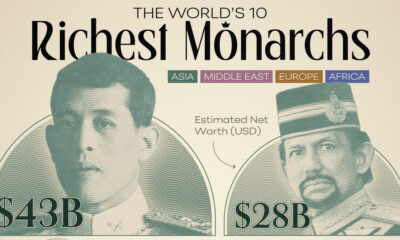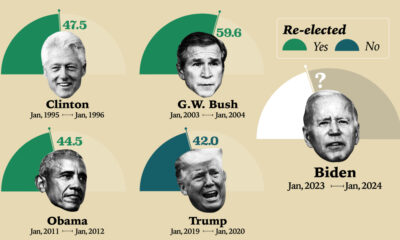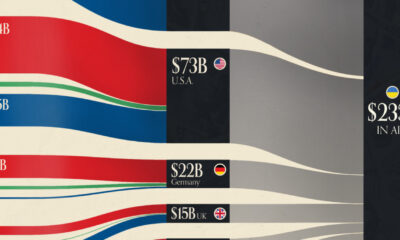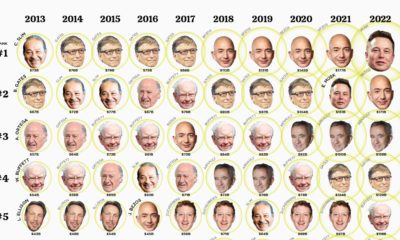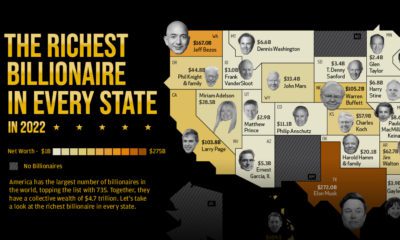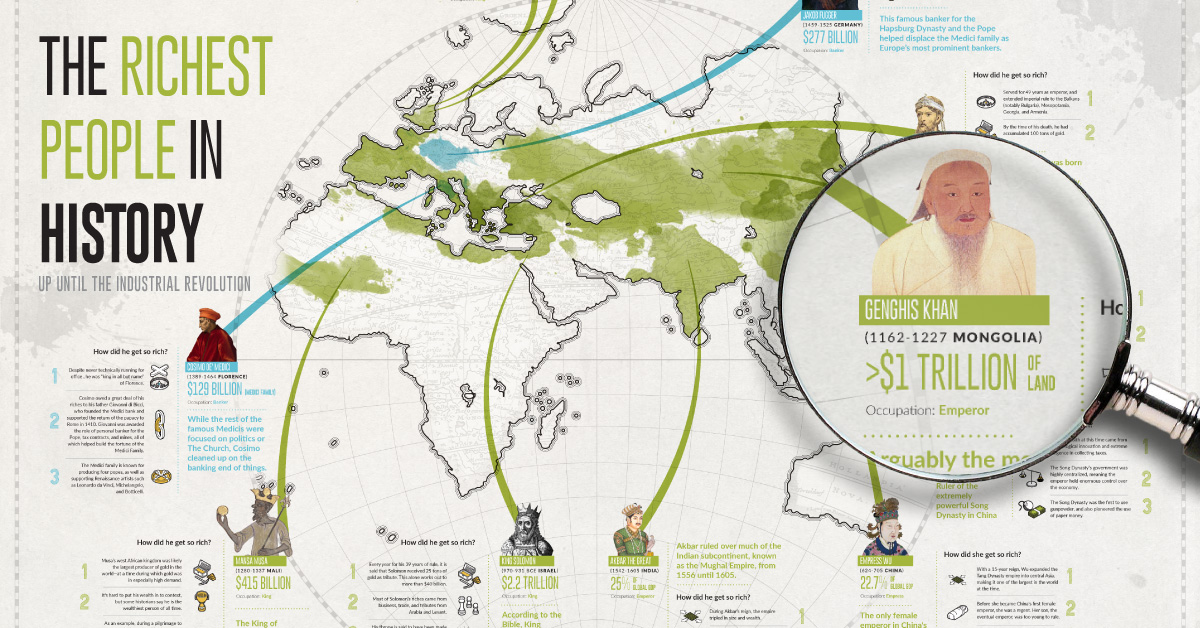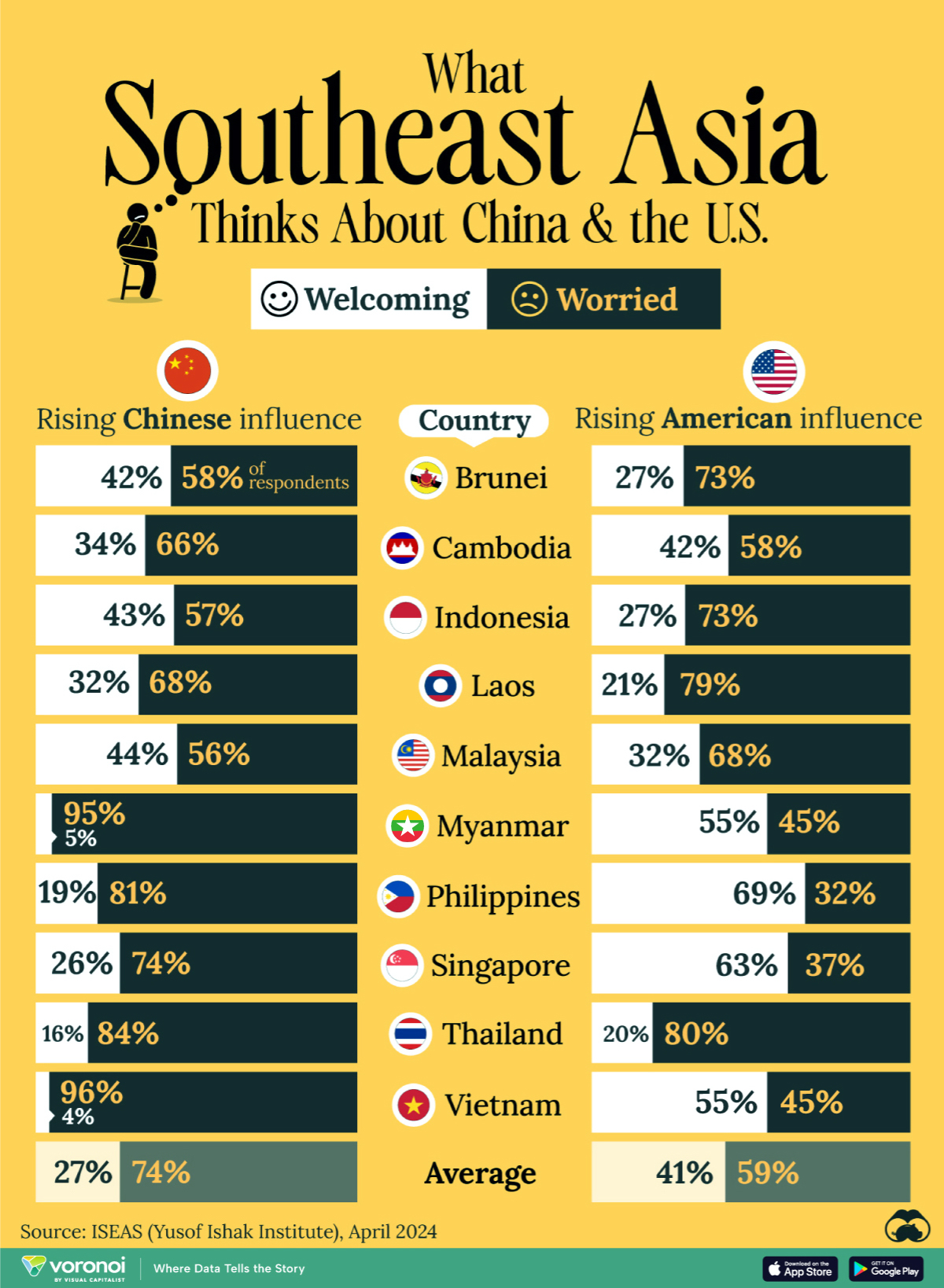Politics
Charted: The Richest Politicians in the U.S.
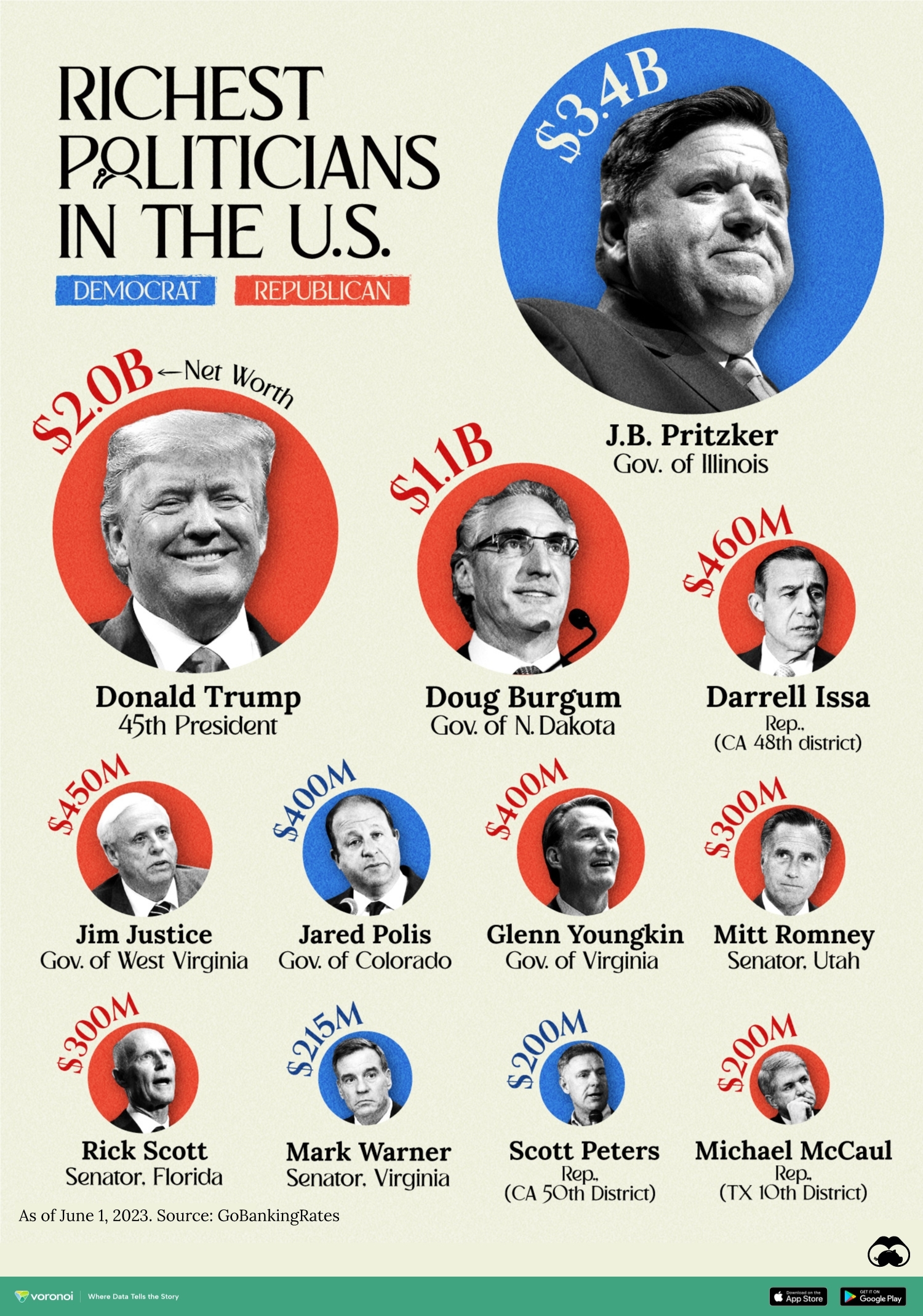
Charted: The Richest Politicians in the U.S.
Entering politics doesn’t require a specific income, yet many politicians are multimillionaires.
At some of the highest echelons of U.S. politics are federal and state-level politicians worth hundreds of millions of dollars, if not billions. Who is the wealthiest U.S. politician today?
This graphic visualizes the net worth of America’s 12 richest politicians, using consolidated data as of June 2023 from GoBankingRates.
Which Politician is Richer Than Donald Trump?
The list of richest politicians in the U.S. includes three billionaires, with the most famous being former U.S. President Donald Trump.
His wealth is closely tied to The Trump Organization, which has interests in real estate, hotels, casinos, and media. But Trump is not the wealthiest U.S. politician by most estimtates.
At the top is the Governor of Illinois Jay Robert Pritzker. A longtime financial supporter of the Democratic Party, he is a member of the wealthy Pritzker family, which owns Hyatt Hotels & Resorts.
| Politician | Title | Party Affiliation | Net Worth |
|---|---|---|---|
| J.B. Pritzker | Governor of Illinois | Democrat | $3.4B |
| Donald Trump | 45th President | Republican | $2B |
| Doug Burgum | Governor of North Dakota | Republican | $1.1B |
| Darrell Issa | Representative (CA 48th District) | Republican | $460M |
| Jim Justice | Governor of West Virginia | Republican | $450M |
| Jared Polis | Governor of Colorado | Democrat | $400M |
| Glenn Youngkin | Governor of Virginia | Republican | $400M |
| Mitt Romney | Senator, Utah | Republican | $300M |
| Rick Scott | Senator, Florida | Republican | $300M |
| Mark Warner | Senator, Virginia | Democrat | $215M |
| Scott Peters | Representative (CA 50th District) | Democrat | $200M |
| Michael McCaul | Representative (TX 10th District) | Republican | $200M |
Completing the billionaires list is North Dakota’s Governor Doug Burgum. In 2001, Burgum sold the accounting software company Great Plains Software to Microsoft for $1.1 billion and later founded several investment firms.
The wealthiest serving member of Congress is Republican Rep. Darrell Issa from California. Issa served as the CEO of Directed Electronics, which he co-founded in 1982. It is one of the largest makers of automobile aftermarket security and convenience products in the United States.
At the bottom of the list is Texas Rep. Michael McCaul. Before being elected to Congress in 2005, the Republican served as Chief of Counter-Terrorism and National Security in the U.S. Attorney’s office, and led the Joint Terrorism Task Force.
United States
Charted: What Southeast Asia Thinks About China & the U.S.
A significant share of respondents from an ASEAN-focused survey are not happy about rising American and Chinese influence in the region.
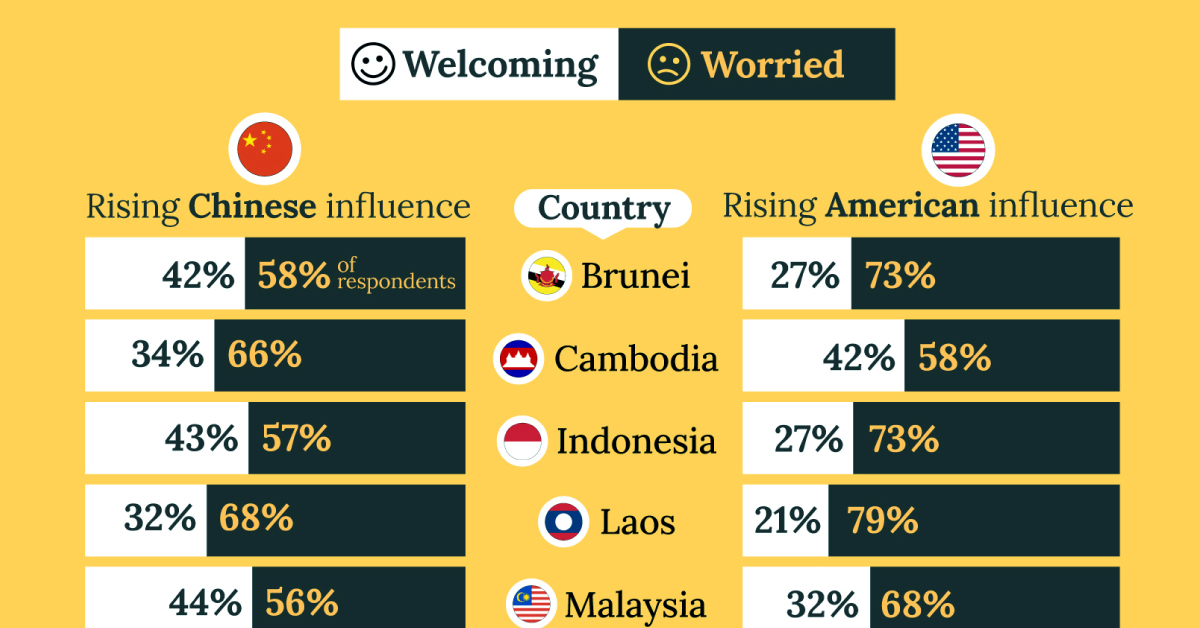
What Southeast Asia Thinks About China & the U.S.
This was originally posted on our Voronoi app. Download the app for free on iOS or Android and discover incredible data-driven charts from a variety of trusted sources.
This chart visualizes the results of a 2024 survey conducted by the ASEAN Studies Centre at the ISEAS-Yusof Ishak Institute. Nearly 2,000 respondents were asked if they were worried or welcoming of rising Chinese and American geopolitical influence in their country.
The countries surveyed all belong to the Association of Southeast Asian Nations (ASEAN), a political and economic union of 10 states in Southeast Asia.
Feelings Towards China
On average, a significant share of respondents from all 10 countries are worried about rising influence from both the U.S. and China.
However, overall skepticism is higher for China, at 74% (versus 59% for U.S.).
| Country | Worried About Growing 🇨🇳 Influence | Welcome Growing 🇨🇳 Influence |
|---|---|---|
| 🇧🇳 Brunei | 58% | 42% |
| 🇰🇭 Cambodia | 66% | 34% |
| 🇮🇩 Indonesia | 57% | 43% |
| 🇱🇦 Laos | 68% | 32% |
| 🇲🇾 Malaysia | 56% | 44% |
| 🇲🇲 Myanmar | 95% | 5% |
| 🇵🇭 Philippines | 81% | 19% |
| 🇸🇬 Singapore | 74% | 26% |
| 🇹🇭 Thailand | 84% | 16% |
| 🇻🇳 Vietnam | 96% | 4% |
| Average | 74% | 27% |
The recently-cooled but still active territorial concerns over the South China Sea may play a significant role in these responses, especially in countries which are also claimants over the sea.
For example, in Vietnam over 95% of respondents said they were worried about China’s growing influence.
Feelings Towards America
Conversely, rising American influence is welcomed in two countries with competing claims in the South China Sea, the Philippines (69%) and Vietnam (55%).
| Country | Worried About Growing 🇺🇸 Influence | Welcome Growing 🇺🇸 Influence |
|---|---|---|
| 🇧🇳 Brunei | 73% | 27% |
| 🇰🇭 Cambodia | 58% | 42% |
| 🇮🇩 Indonesia | 73% | 27% |
| 🇱🇦 Laos | 79% | 21% |
| 🇲🇾 Malaysia | 68% | 32% |
| 🇲🇲 Myanmar | 45% | 55% |
| 🇵🇭 Philippines | 32% | 69% |
| 🇸🇬 Singapore | 37% | 63% |
| 🇹🇭 Thailand | 80% | 20% |
| 🇻🇳 Vietnam | 45% | 55% |
| Average | 59% | 41% |
Despite this, on a regional average, more respondents worry about growing American influence (59%) than they welcome it (41%).
Interestingly, it seems almost every ASEAN nation has a clear preference for one superpower over the other.
The only exception is Thailand, where those surveyed were not a fan of either option, with 84% worried about China, and 80% worried about the U.S.
-
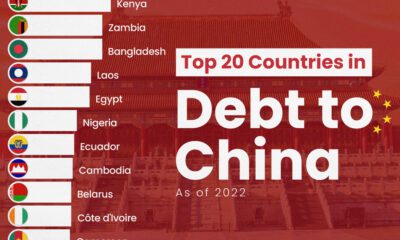
 Economy7 days ago
Economy7 days agoRanked: The Top 20 Countries in Debt to China
-
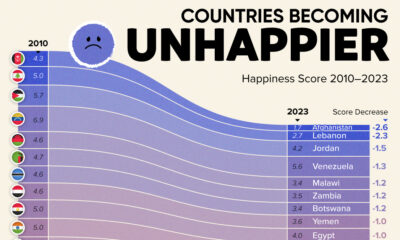
 Demographics2 weeks ago
Demographics2 weeks agoThe Countries That Have Become Sadder Since 2010
-
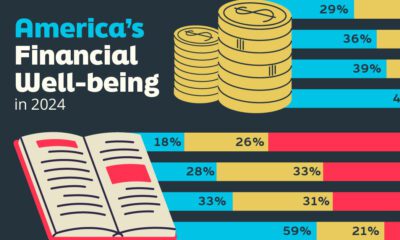
 Money2 weeks ago
Money2 weeks agoCharted: Who Has Savings in This Economy?
-
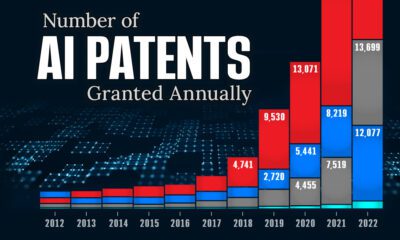
 Technology2 weeks ago
Technology2 weeks agoVisualizing AI Patents by Country
-
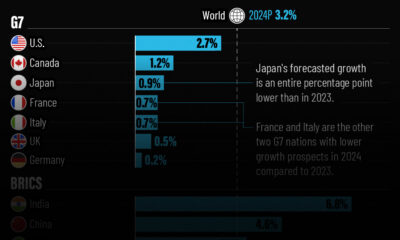
 Economy2 weeks ago
Economy2 weeks agoEconomic Growth Forecasts for G7 and BRICS Countries in 2024
-
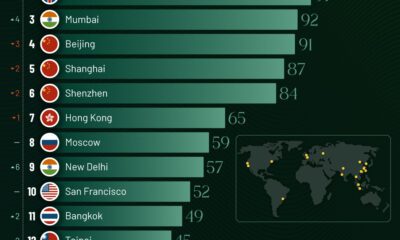
 Wealth2 weeks ago
Wealth2 weeks agoCharted: Which City Has the Most Billionaires in 2024?
-
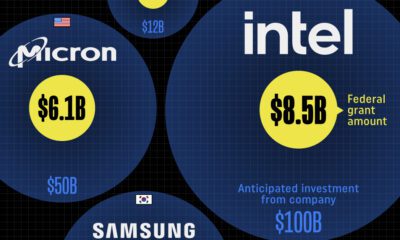
 Technology1 week ago
Technology1 week agoAll of the Grants Given by the U.S. CHIPS Act
-

 Green1 week ago
Green1 week agoThe Carbon Footprint of Major Travel Methods

